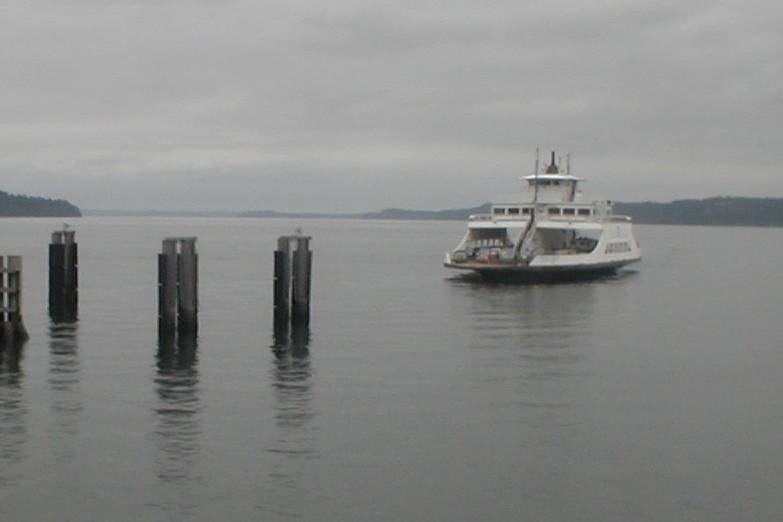Like most of the best isles in Puget Sound, there isn’t much to Anderson Island: A general store, a tasty barbecue joint, little traffic and lots of views.
The island, the southernmost in the Sound, is accessed via a Pierce-County-run ferry out of Steilacoom. At present, ferry operations are funded by county road dollars, as well as fares collected by ferry riders, most of whom drive on to the ferry in cars and cough up $20 for the privilege.
However, Pierce County says that, in the long run, the ferry is not financially sustainable, and is looking to open up a new stream of revenue to fund it. Specifically, the county wants the state to give it the power to create a special property tax district, in which homeowners in the district would help pay for the service to be maintained. At present, only walk-on ferries—those that don’t support vehicles—can be supported by such a property tax district. But a bill now moving through the legislature would facilitate the creation of a taxing district to support vehicle ferries; its primary sponsor is Sen. Steve O’Ban, a Republican from University Place whose district includes Anderson Island.
And that’s where this gets interesting, from a Seattle perspective. When he’s not making it possible for Pierce County to create a new tax that would help people drive to Anderson Island, O’Ban has been a leading critic of Sound Transit, and has introduced a slate of bills aimed at undercutting its ability to deliver on the $54 billion Sound Transit 3 transportation package approved by voters by an 8 point margin last fall. Perhaps most audaciously, O’Ban was co-sponsor of an unsuccessful effort to allow municipalities to essentially opt-out of paying ST3 taxes, a measure that would have rescinded from Sound Transit the very kind of taxing authority he hopes to give Pierce County for the ferry. He’s also joined with Sen. Dino Rossi in questioning the constitutionality of ST3.
To some, the dual efforts speak to the double standard that many policy makers in Olympia hold for transportation projects, depending on whether the projects support mass transit or car travel.
“I think it raises a fair philosophical question: If you don’t like a certain program, do you have the right to pull out of that program but still receive the benefits of public spending for programs you do like?” Sen. Reuven Carlyle, a Seattle Democrat, says. Carlyle, for his part, took a lot of heat last fall for opposing ST3, and was also one of just a handful of senators to vote against O’Ban’s ferry-tax bill. He argues their both wrongheaded because they use property taxes to fund transportation instead of schools.
Last week the pro-ST3 group Transportation Choices sent out a press release calling out several of O’Ban’s bills as efforts to “delay Sound Transit Progress.” When asked about the ferry-tax bill, executive director Shefali Ranganathan says it was typical Olympia politics.
“It’s interesting that some legislators have one standard for transit and a completely different standard for other transportation projects,” says Ranganathan.
O’Ban did not return a call for comment on the bills.
O’Ban, of course, is not the only lawmaker in Olympia taking aim at Sound Transit. As taxpayers start to dish out for the voter-approved transit expansion, some are reporting sticker shock. That’s in part because of some fine-print in the plan that taxes cars based on a value that is often times greater than the Kelly Blue Book. There is a bipartisan effort—again led by O’Ban—to change that part of the law.
However, Republicans who oppose ST3 are clearly trying to press their advantage with bills that would affect Sound Transit far beyond how car tabs are tabulated. Along with the bill to allow towns to opt-out of paying their ST3 taxes (which died in committee), there is another bill that would make the Sound Transit board elected. While proponents of the bill say it would make Sound Transit more accountable (“Sen. O’Ban warns without elections Sound Transit could spend and tax forever,” the senate GOP tweeted on March 1), transit advocates say the real intent is clear.
“This bill is a transparent attempt to override the will of the voters in approving Sound Transit by adding yet more veto points to the process,” Martin H. Duke wrote on Seattle Transit Blog recently. The elected-board bill has passed the Senate, but may not get a hearing in the House.
As for the ferry district bill, it seems to be enjoying strong, bipartisan support. It passed the Senate with ease, with a similar measure making its way through the House. One of the few notes of dissent comes from a member of O’Ban’s own party, who used some of the same antitax rhetoric that’s being deployed against ST3.
“There is no way I am going to support any kind of tax that is going to fall on the heads of low-income people so people who can afford a plush place on Anderson Island can get their ferries paid for,” Rep. Jesse Young, R-Gig Harbor, told the Tacoma News-Tribune. “That just seems fundamentally unfair.”
dperson@seattleweekly.com








